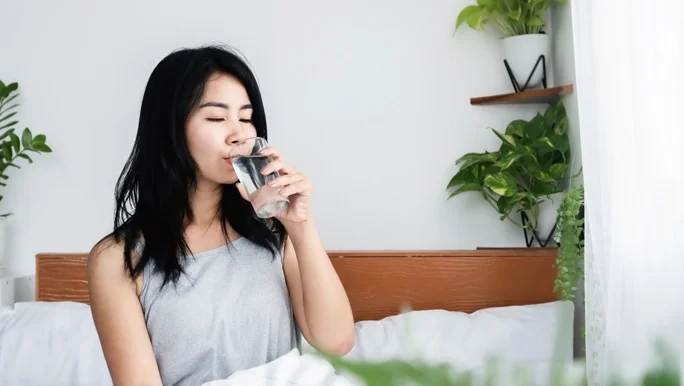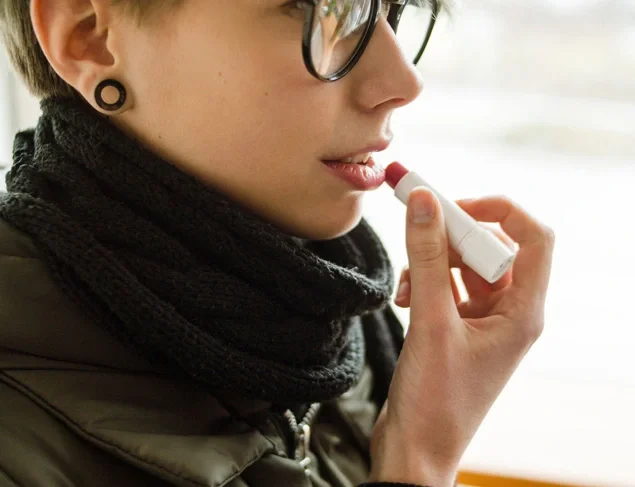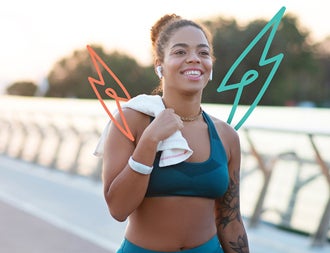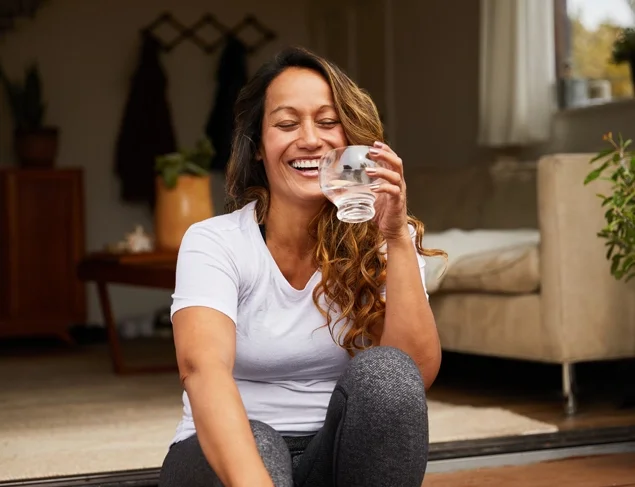Are you drinking enough water? 7 signs to find out

It’s tricky to drink enough water and it’s something many of us struggle with. Forgetting to drink water happens, especially if you’ve fallen out of the habit.
It is an important part of being healthy and can help you feel your best to stay hydrated. If your body uses up or loses more water than you consume, you can become dehydrated. This isn’t great news for your body, which is made up of anywhere between 50% - 80% water.
But how much water do you actually need to drink?
We each have unique bodies so does someone who is 6ft 7 tall need the same amount of water as someone who is 5ft tall? Here are some simple ways to tell if you’re drinking the right amount of water for your brilliant - and unique - body.
7 signs you aren’t drinking enough water
1. Darker coloured pee
If your urine is dark in colour, it could be a sign that you need to up your water intake. On the flip side, if your pee is light yellow in colour, it could be a sign that you’ve been hitting your body's water requirements.
Our guide to tell if you are hydrated comes complete with a urine colour chart to help you work it out.
2. Strong-smelling urine
You might also notice a stronger smell from your pee if you’re a bit dehydrated. If you become very dehydrated, you may even urinate less than usual, something to take note of and speak to your doctor about.
3. Cracked, dry lips

How to get rid of dry lips
Dry lips may be from licking your lips too much but could also indicate other issues going on. Our expert explains.
While many factors can contribute to chapped lips including certain medications and the weather, dehydration may also be a factor to consider. If you find you’re often reaching for the lip balm, try drinking more water and see if it helps.
4. Dry skin
Another thing you might notice if you aren’t drinking enough water is that your skin might be dry. If you’ve become best buds with your moisturiser recently, maybe check in on your water intake.
5. Feeling thirsty
You might be surprised to know that by the time you feel thirsty, you may already be dehydrated. Ideally, drink water routinely to avoid feeling thirsty. And if you do notice excessive thirst, it could be a sign of dehydration but it’s best to speak to your doctor to rule out other causes of excessive thirst.
6. Headache
If you’re experiencing mild to moderate dehydration, you may also experience headaches get muscle cramps - which won’t leave you feeling your best. Having a glass of water (or a few) could be a good idea.
7. Constipation
Water helps your gut to move food through your digestive system. And when you don’t drink enough water and become dehydrated, your body may hold onto fluid which can contribute to constipation.
3 factors that contribute to dehydration
While it’s easy to forget to drink water or not be in the routine of sipping frequently, some things can make it a little trickier to stay optimally hydrated.
Let’s take a look at some of the big ones.
1. Exercise

How much exercise do I really need?
Is 30 minutes per day of exercise most days really enough? Yes, it is – although many of us seem to struggle to get that much.
While exercise does supremely wonderful things for your body and health, it can dehydrate us a bit, especially if we’re sweating a lot. Unless you’re an athlete, drinking water to rehydrate your body after a workout will do the trick without needing to turn to sports drinks.
Keep in mind that if you have a pre-workout supplement, try to add in an extra bit of water to help you keep your body hydrated.
2. Hot weather
It’s a smart thing to drink up on hot days! When the weather is particularly balmy, you’ll need to up your water intake to make up for any extra water lost via sweating, particularly if you’ve been out in the sun.
3. Illness
It’s important to keep in mind that experiencing diarrhea, vomiting or excessive sweating can lead to dehydration. It’s important to replenish the water you lose to help support your body, along with important electrolytes. And remember, if these symptoms persist to see your doctor.
Does coffee dehydrate you?
Coffee and tea do in fact contribute to hydration but it’s important to be mindful of the caffeine content. For every caffeinated beverage you have, it’s a good idea to balance it out with a tall glass of water or consider mixing it up with herbal tea.
related reads
Lyndi Cohen is one of Australia's most trusted dietitians (APD) and is a previous member of the healthylife Advisory Board. She's also the creator of Back to Basics, an app to help you be healthy without dieting. It takes the guesswork out of choosing what's for every night and helps you ditch yo-yo dieting.
You'll get quick and deliciously simple recipes inside a flexible meal planner to make planning, shopping, and cooking a breeze. Plus, access to enjoyable workouts and expert mindset tips by qualified health experts to help you stay on track. And it's pregnancy and postnatal-friendly. Start your free 7-day trial today.
Reviewed by the healthylife Advisory Board July 2022


